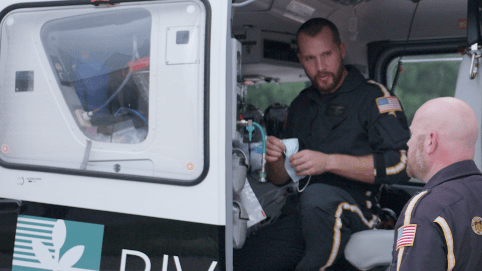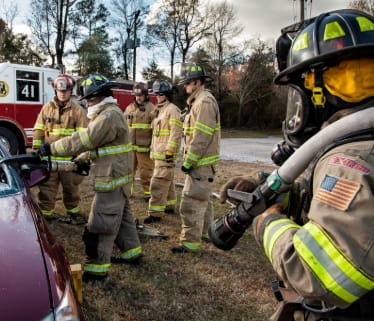Riverside is set up to support trauma patients through the immediate crisis, stabilization, recovery and rehabilitation. There are also comprehensive programs supporting patients through traumatic injuries, such as orthopedic traumas and spinal cord injuries.
As part of being a Level II Trauma Center, the team at Riverside Regional Medical Center works closely with the first responders across the region, partnering with the Peninsula Medical Services Council (PEMS) and Tidewater Emergency Medical Services Council (TEMS) to provide education and collaborate, ensuring everyone’s protocols work together smoothly in an emergency. The first responders throughout the region are highly trained and work closely with the emergency department staff during transport to the hospital. Through tests and assessments done in the ambulance, they can help determine specific injuries faster, allowing the hospital to be better prepared to receive the patient and start treatment immediately.
As part of collaboration with local EMS, Riverside is a sponsoring partner of the Hampton Roads Trauma Symposium held every spring. This day-long event allows EMTs, paramedics, emergency department nurses, respiratory therapists, emergency physicians and other staff to come together to learn how to best care for patients from the scene of an accident all the way through discharge and recovery.
As part of the ongoing partnership with PEMS, TEMS, and area localities as well as Virginia and Federal Department of Emergency Management personnel, Riverside’s Trauma Program also takes part in ongoing disaster preparedness efforts across the region. Through these efforts, standardized disaster response structures and regular drills, the entire region works to always be ready to respond to a disaster or mass casualty event.
Some trauma patients require immediate transport from the scene of an accident or another hospital, and those patients are often served by a LifeEvac helicopter. Riverside is proud to partner with VCU Health System, Bon Secours and Mary Washington Healthcare, in conjunction with the Med-Trans Corporation, to provide air medical transport services to the region. There are multiple helicopters in the fleet stationed at three different bases in order to serve the critical care air support needs. As with all traumas, patients are transported to the most appropriate hospital in the region strictly based on the patient’s clinical needs.


